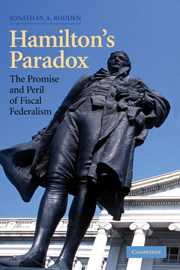Book contents
- Frontmatter
- Contents
- Preface
- Acknowledgments
- 1 INTRODUCTION AND OVERVIEW
- 2 PROMISE AND PERIL: INTELLECTUAL HISTORY
- 3 SOVEREIGNTY AND COMMITMENT
- 4 THE POWER OF THE PURSE: INTERGOVERNMENTAL GRANTS AND FISCAL DISCIPLINE
- 5 DISEASE OR CURE? POLITICAL PARTIES AND FISCAL DISCIPLINE
- 6 AN APPROACH TO COMPARATIVE CASE STUDIES
- 7 FISCAL FEDERALISM AND BAILOUTS IN POSTWAR GERMANY
- 8 THE CRISIS OF FISCAL FEDERALISM IN BRAZIL
- 9 THE CHALLENGE OF REFORM IN FEDERATIONS
- 10 THE ORIGINS OF SUBNATIONAL SOVEREIGNTY
- 11 CONCLUSIONS
- References
- Index
- Titles in the series
5 - DISEASE OR CURE? POLITICAL PARTIES AND FISCAL DISCIPLINE
Political parties and fiscal discipline
Published online by Cambridge University Press: 14 January 2010
- Frontmatter
- Contents
- Preface
- Acknowledgments
- 1 INTRODUCTION AND OVERVIEW
- 2 PROMISE AND PERIL: INTELLECTUAL HISTORY
- 3 SOVEREIGNTY AND COMMITMENT
- 4 THE POWER OF THE PURSE: INTERGOVERNMENTAL GRANTS AND FISCAL DISCIPLINE
- 5 DISEASE OR CURE? POLITICAL PARTIES AND FISCAL DISCIPLINE
- 6 AN APPROACH TO COMPARATIVE CASE STUDIES
- 7 FISCAL FEDERALISM AND BAILOUTS IN POSTWAR GERMANY
- 8 THE CRISIS OF FISCAL FEDERALISM IN BRAZIL
- 9 THE CHALLENGE OF REFORM IN FEDERATIONS
- 10 THE ORIGINS OF SUBNATIONAL SOVEREIGNTY
- 11 CONCLUSIONS
- References
- Index
- Titles in the series
Summary
Party-spirit is an inseparable appendage of human nature. It grows naturally out of the rival passions of Men, and is therefore to be found in all Governments. But there is no political truth better established by experience nor more to be deprecated in itself, than that this most dangerous spirit is apt to rage with greatest violence in governments of the popular kind, and it is at once their most common and their most fatal disease.
Alexander Hamilton, The Defense No. 1The one agency that might be expected to harmonize the policies of central and constituent governments is a political party. If the officials of both sets of governments are adherents of the same ideology or followers of the same leader or leaders, then they might be expected to pursue harmonious policies.
William Riker and Ronald Schaps “Disharmony in Federal Government”The peril of decentralization is that along with increased responsibility for local officials – and the potential for increased local accountability – comes increased local self-seeking that can impose externalities and undermine the provision of national collective goods. The previous two chapters have explored a serious implication for fiscal discipline and macroeconomic stability: Subnational governments might manipulate the central government's cofinancing obligations and make fiscal decisions that shift their burdens onto others. This can create a cooperation problem.
- Type
- Chapter
- Information
- Hamilton's ParadoxThe Promise and Peril of Fiscal Federalism, pp. 119 - 139Publisher: Cambridge University PressPrint publication year: 2005

